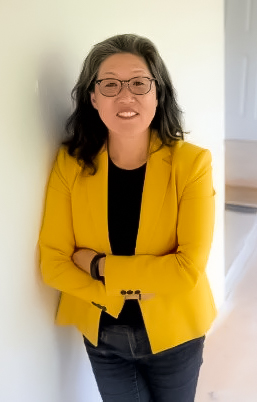Richmond +510-974-7200
Concord +925-521-6366
Antioch +925-281-0970

April 2024
March 2024 marked my tenth anniversary here at the Family Justice Center. This decade, marked by enormous changes in our county, our country and our world, has passed quickly, with so many triumphs to celebrate, so many new friends to appreciate, and so many learnings to share.
When I started here in 2014, the Center was a bare-bones program with five staff and a budget of $700,000, operating out of a police substation at the Hilltop Mall in Richmond. In 2015, we opened two new freestanding Centers in Concord and Richmond and assisted about 1,100 clients. In 2019, we opened our third Center in East County. Fast forward to 2023: our three Centers in Richmond, Concord and Antioch served almost 5,000 families with 3,000 children; our sister site in Solano County served over 1,200 families with 900 children. With a staff of 50 and more than 90 community and county partner agencies across two Counties, we are truly making a difference in our community.
Building Community From The Inside Out
While this tremendous growth affirms that our one-stop service model works effectively, I am most proud of the fact that we have steadfastly held to our mission to “create a community that is there to support the healing process for those who are affected by any form of family violence and human trafficking.” Community is central to the success of our mission, strategies, partnerships, and day-to-day work. Collaboration is essential but hard; agencies must navigate their own cultures, budget constraints, and power dynamics to work effectively together. Over the past decade, we and our partners have built the strong relationships essential to creating community.
One of my favorite examples of our community building work is our Community Fellowship program, now also a decade old. Since 2014, the Community Fellowship has provided IPV survivors (adults and youth) with skills, mentorship, training, access to a learning community, a small monetary stipend, and ongoing support as they each develop and execute an independent, self-directed community project. We intentionally and explicitly invite Fellows to contribute to our programs their best ideas and insight from their lived experiences. Over the years, the Fellows’ work and ideas have changed our policies, protocols, and practices to make them more relevant and effective. Their community projects, big and small, have made lasting changes at the Center, and they continue to be key stakeholders and active participants in our work and community even when they no longer need crisis intervention or safety support.
Stories of Resilience
My grandpa from North Korea became an orphan at age 3, quit school to start his own trading business at age 14, crossed the North-South Korean border on foot with his eldest daughter (my mom) on his back, and then started a popular candy factory in Seoul. After losing his left arm in an aerial bombing, he operated the best public bath house in Deajon (my birth city). Years late he fought his last battle with stomach cancer. He also raised and supported four children who all graduated from college.
After some years of soul searching, I serendipitously found my first public interest law job representing abused immigrant women in 1997. Every new client shared her story with me, each devastating in its own way. One client spoke about how she was raped by different soldiers while trying to escape her hometown to a refugee camp in Hong Kong. She developed PTSD and depression, while her husband abused her physically and sexually. Another client told me she had to leave her baby with her husband in California and move to New York to be with her family because she had no way to support both the baby and herself. One client came to me because her husband had said she and their two boys had to move out because he had stopped paying the mortgage on their family home. What did these clients have in common? They did not give up. My clients, like my orphaned grandpa, relied on their inner strength and resilience, took action, and changed their lives.
They also had community. My grandpa had a supportive uncle who gave him money to start his business. He had a life-long partner, my grandma, who gave him unconditional love. My refugee client had a sister and niece to help her navigate complex legal systems. The client who left her baby behind had family support in New York. A year later, she came back to California and we got her custody of her child. My about-to-be homeless client had two strong sons who came to every one of our meetings. I remember their concerned faces. Yes, community is central to our successes.
Looking Ahead
The Family Justice Center’s newest Strategic Plan builds on the framework developed by Mike Wong, my friend and mentor, a civil rights lawyer, social justice activist, master facilitator and strategic planning consultant, and a great supporter of the Family Justice Center. Mike passed away in June 2018. Six years on, we honor his legacy in our goals for 2022-2027, with a focus on four key shifts that acknowledge and build on our evolution toward a stronger community,
well-equipped and working together “to address the root causes of all forms of violence, including historical trauma and structural racism.” In the next decade, we will focus on shifting from individual advocacy to systemic advocacy, from responding to preventing harm, to providing transformative opportunities, and on building our connections to clients and each other.
I envision a future where all people in our community live free of violence and discrimination, feel respected and safe, and have meaningful access to resources. It will take all of us working together in community, resilient, and standing strong in the face of challenges. Like our clients, and my grandpa, we will never give up. Together we will make it happen.
© 2025 Family Justice Center. Built using WordPress and the Mesmerize Theme